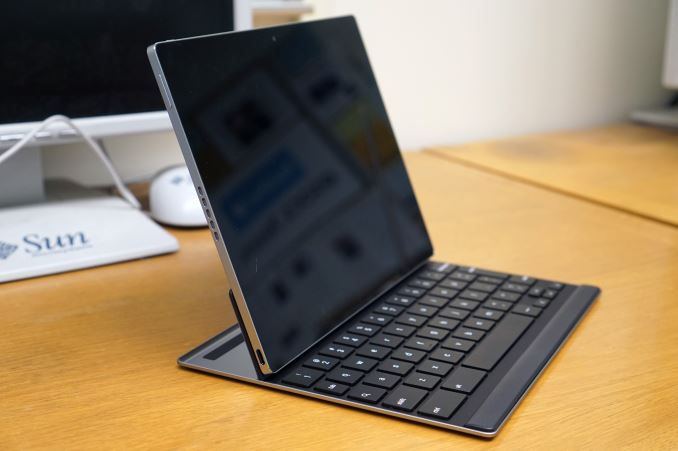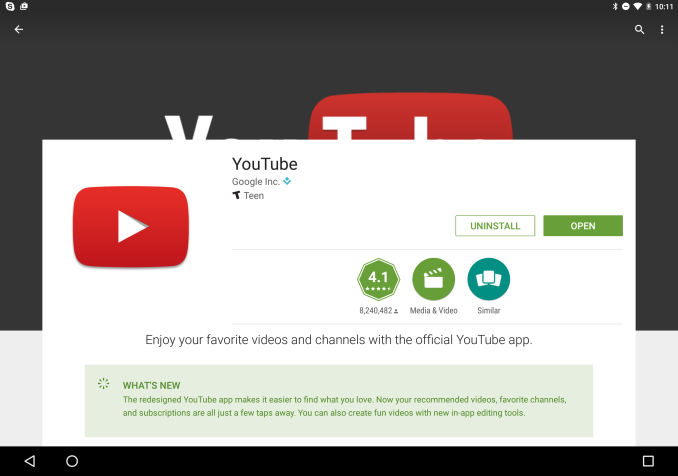The Google Pixel C Review
by Brandon Chester & Joshua Ho on January 25, 2016 8:00 AM ESTFinal Words
Ultimately, the Pixel C ends up being a strange mix of things that may have worked together in a much more cohesive manner had it shipped with Chrome OS like it was clearly intended to. Unfortunately, Android just doesn’t provide an acceptable tablet experience, and Google’s own applications are some of the biggest offenders. Before discussing that, it is worth going over the Pixel C’s hardware, as Google did a great job executing many of those aspects.
The Pixel C’s construction is solid. The build quality is superb, and it fits in well with the existing Chromebook Pixel. I definitely think the body is too heavy though, and the keyboard is far too heavy. I don’t think building tablet keyboards out of aluminum is the right way to go, even though it makes them feel very sturdy and fits well with an aluminum chassis. The mass ends up being too high compared to fabric and polymer keyboard covers, and keeping down the mass of the total package is essential to making a tablet highly portable.
As for the hardware, the first thing to talk about is the SoC. Tegra X1 is very fast on both the CPU and GPU sides, and as far as Android tablets go it offers the best graphics performance that you can get. The display on the Pixel C is also very good, with accurate color rendering and a high brightness as well as deep blacks. The greyscale accuracy could use some work, and Google needs to improve on hiding their digitizer and cutting down reflections in general, but for the most part it’s a very good panel.
Battery life on the Pixel C appears to be very good. It topped the charts in our web browsing, video playback, and BaseMark OS II battery tests. However software problems prevent me from investigating how long the battery lasts in a GPU-bound workload and a mixed workload, but for anything that primarily taxes the CPU or display it appears that the Pixel C provides best-in-class battery life.
Why does this UI show the exact same amount of info as the UI on a 4.5" phone?
Unfortunately, once you start looking at some of the other aspects of hardware and software, the problems with the Pixel C start appearing in great numbers. I’ve said this time and time again, but Android simply doesn’t offer a compelling tablet experience in any regard. With the Pixel C in particular you get a plethora of stability issues and bugs as well. Connectivity issues with Wi-Fi and Bluetooth impact the usability of the keyboard, and the entire software experience is simply unfinished. I can’t use it for very long without encountering touch input issues, freezes, and complete OS crashes. I really don't know how Pixel C shipped with the software in the state that it’s in, and it's just not acceptable. The fact that Josh also received a sample and encountered the same issues that I have confirms that they’re not specific to a single unit, and any single one of the major issues that we’ve noticed should have been enough to delay the Pixel C’s launch.
By this point I think people should know what they’re getting into when buying an Android tablet as far as the application situation goes, but the Pixel C’s problems go far deeper than that. I have been told that Google plans to issue an update that fixes the connectivity problems, touch input issues, and stability. Google has shipped me with a new unit that runs a pre-release version of this update, and Josh will be receiving his soon as well. Once that occurs, I'll be taking another look at it. That being said, the amount of time it has taken to address such show stopping bugs has been far longer than I would have expected, and if I was someone who purchased it I wouldn't be happy at all with the current situation.
At the very least, I think existing buyers should be given some public timeline of when Google plans to issue the much needed bug fixing updates. In its current state, I honestly can’t give the Pixel C any sort of recommendation, even to the biggest fans of Google products. Its software needs a lot of work, and I hope that Google's upcoming patch fixes the major problems. The Pixel C may improve with future updates, but for now it's best to hold off and see how things change going forward.












122 Comments
View All Comments
ImSpartacus - Monday, January 25, 2016 - link
How disappointing. I hope the iPad can some day see some actual competition from something other than an x86 tablet.vFunct - Monday, January 25, 2016 - link
Not going to happen. The Google ecosystem is focused on ignorant third-world consumers that think more cores are somehow better than faster individual cores. It's a problem of Google's making, where they have the mistaken belief that targeting the poorer class will somehow make their products superior against those that target the upper-class, like Apple.Apple will reign supreme as long as everybody else has no clue how to market to the upper class.
ImSpartacus - Monday, January 25, 2016 - link
Yeah, Asia's obsession with core count is quite curious.It's particularly depressing that non-apple arm tablets don't take off because it really kneecaps any incentives for anyone to make high performance SoCs with tablet-tier thermal budgets. They have to adapt phone SoCs for that purpose because the tablet market isn't big enough to justify its own SoCs (unless you're Nvidia and you can't make anything smaller). So it means that stuff like the a9x can just sweep the floor and it's only challenged by x86 stuff because that's the only other source of legitimate high performance tablets.
Murloc - Monday, January 25, 2016 - link
In Spain apple has a 9% marketshare.Maybe they're ignorant third-worlders, or maybe it isn't as simple as you say.
Sttm - Monday, January 25, 2016 - link
Spain has almost 50% youth unemployment. As such its not hard to see why their tech preferences favor cheaper hardware originally destined for the 3rd world.But then again if Spain does not start to turn around its employment situation, it will be the 3rd world before too long.
WinterCharm - Tuesday, January 26, 2016 - link
Exactly. You have to look at purchasing power of a nation. Apple markets to the young and wealthy upper class.There's a reason Apple only has 5-6% of the market share. But 90% of profits, and 90% market share in the $1000+ computer category is because they refuse to pander to the lower segments of the market.
If you want the best and you can afford it, you buy Apple gear.
Alexvrb - Wednesday, January 27, 2016 - link
If you want the best, can afford it, and are tech savvy, you get a Surface Pro or similar top-tier device.In the case of the Pixel C, even a "lowly" non-Pro Surface 3 is a better value. Mostly due to the superior Cherry Trail SoC.
Alexvrb - Wednesday, January 27, 2016 - link
Oh, except in 3D graphics. Intel still sucks there on their lower power chips. So I guess if you're buying one to play high-graphics games that would be stupid. But for other tasks Cherry Trail is great, I set one up with a dock for someone that uses it as their tablet and "desktop" PC and general purpose performance, multitasking etc is pretty decent. Even has HEVC hardware decoding support. The NAND is even reasonably fast, has enough RAM and they have the 128GB model plus a USB SSD attached to their dock so storage isn't an issue (has SD slot for easy mobile storage expansion too).ImSpartacus - Wednesday, January 27, 2016 - link
I think he's speaking more broadly about laptops and the whole nine yards.Lolimaster - Tuesday, January 26, 2016 - link
Problem is youre not paying for the best, just bragging rights while getting scammed and locked in their ecosystem, the perfect fool.